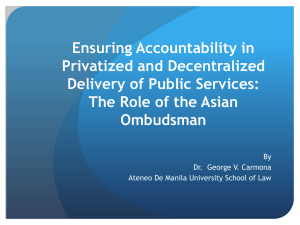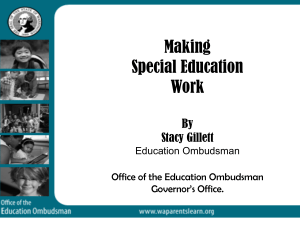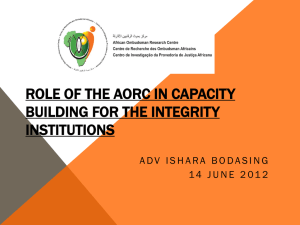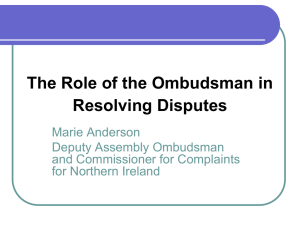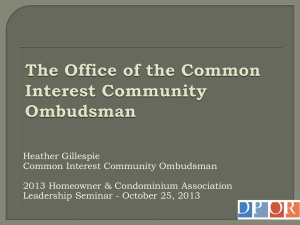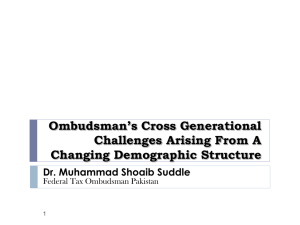UCT Ombud Presentation for Conflict Dynamics Sept 2014
advertisement
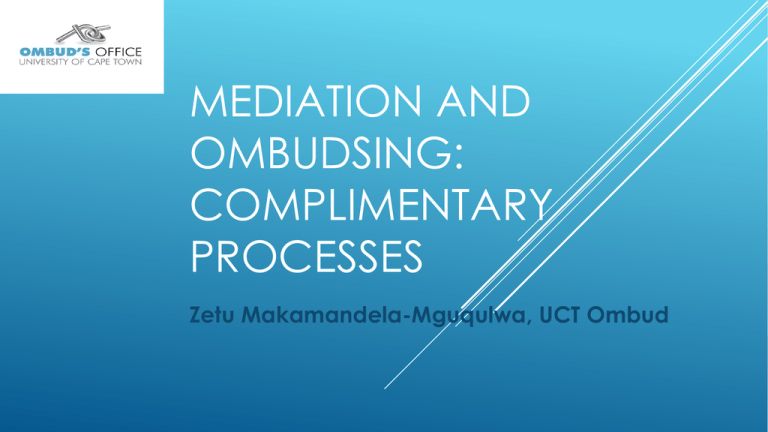
MEDIATION AND OMBUDSING: COMPLIMENTARY PROCESSES Zetu Makamandela-Mguqulwa, UCT Ombud DEFINITION OF OMBUDSMAN The word “Ombudsman” is Swedish, and means “representative”. The word is not gender specific, although many universities are using the terms “ombuds,” or “ombudsperson,” in an effort to make the word gender neutral. The modern use of the term began in 1809, when the Swedish government created the office. Sweden and several other European countries appointed a relatively senior and respected official who would have access to all levels of government, from the prime minister, through the heads of ministries, to directors of lower-level administrative agencies, and could cut through red tape and work to resolve problems relatively expeditiously. Since the 1950s, many states, universities, and businesses have created ombudsman offices. (John C. Keene, University Ombudsman, University of Pensylvania, Almanac – Vo. 54, No. 27, 2008) INTERNATIONAL OMBUDSMAN ASSOCIATION The International Ombudsman Association (IOA) was officially formed in July 2005 following the merger of the University and College Ombuds Association (UCOA) and The Ombudsman Association (TOA). The Association supports organizational Ombudsmen worldwide working in corporations, universities, nonprofit organizations, government entities and non-governmental organizations. IOA is the largest international association of professional organizational Ombudsmen practitioners in the world, representing more than 737 members - 145 of whom reside outside U.S. borders. About a third of the total membership belongs to the academic sector. INTERNATIONAL OMBUDSMAN ASSOCIATION The IOA is dedicated to excellence in the practice of Ombudsman work. The IOA Code of Ethics provides a common set of professional ethical principles to which members adhere in their organizational Ombudsman practice. Based on the traditions and values of Ombudsman practice, the Code of Ethics reflects a commitment to promote ethical conduct in the performance of the Ombudsman role and to maintain the integrity of the Ombudsman profession. WHAT IS AN ORGANIZATIONAL OMBUD? An Organizational Ombudsman is an individual who serves as a designated neutral within a specific organization and provides conflict resolution and problem-solving services to members of the organization (internal ombudsman) and/or for clients or customers of the organization (external ombudsman). There are Organizational Ombudsmen in all sectors (corporate, academic, governmental, non-governmental, and non-profit). Some may serve both internal and external constituencies. WHAT IS AN ORGANIZATIONAL OMBUD? An Organizational Ombudsman provides confidential, informal, independent and impartial assistance to individuals through dispute resolution and problem-solving methods such as conflict coaching, mediation, facilitation, and shuttle diplomacy. The Organizational Ombudsman responds to concerns and disputes brought forward by visitors to the office and may report trends, systemic problems, and organizational issues to high-level leaders and executives in a confidential manner. He or she does not advocate for individuals, groups or entities, but rather for the principles of fairness and equitable results. The Organizational Ombudsman does not play a role in formal processes, or represent any side in a dispute. OTHER TYPES OF OMBUDSMEN • Classical Ombudsman: • These Ombudsmen receive and investigate complaints and concerns regarding governmental policies and processes. The authority and mandate of Classical Ombudsmen are typically provided by statutory language. These Ombudsmen may be elected by constituents or appointed by a legislature or organization to monitor citizens’ treatment under the law. Classical Ombudsmen generally have authority to conduct investigations and make recommendations for appropriate redress or policy change. OTHER TYPES OF OMBUDSMEN • Advocate Ombudsmen: • An Advocate Ombudsman may be located in either the public or private sector. He or she evaluates claims objectively but is authorized or required to advocate on behalf of individuals or groups found to be aggrieved. Advocate Ombudsmen are often found in organizations such as long-term care facilities or agencies, and organizations that work with juvenile offenders. OTHER TYPES OF OMBUDSMEN • Hybrid Ombudsmen: • Hybrid Ombudsmen are usually established by policy or terms of reference by both private and public sector organizations. They primarily use informal methods to resolve complaints but also have the power to investigate and the authority to publish annual and special reports. OTHER TYPES OF OMBUDSMEN • Executive Ombudsmen: • An Executive Ombudsman may be located in either the public or private sector and receives complaints concerning actions and failures to act of the organization, its officials, employees and contractors. An Executive Ombudsman may either work to hold the organization or one of is programs accountable or work with the organization’s officials to improve the performance of a program. OTHER TYPES OF OMBUDSMEN • Legislative Ombudsmen: • A Legislative Ombudsman is a part of the legislative branch of a government entity and addresses issues raised by the general public or internally, usually concerning the actions or policies of government entities, individuals or contractors with respect to holding agencies accountable to the public. OTHER TYPES OF OMBUDSMEN • Media Ombudsmen: • The Media, or News, Ombudsman is familiar to many people. The News Ombudsman’s primary objective is to promote transparency within his or her news organization. This Ombudsman can receive and investigate complaints about news reporting on behalf of members of the public and then recommend the most suitable course of action to resolve issues raised in the complaints. The News Ombudsman is an independent office acting in the best interests of news consumers. He or she explains the roles and obligations of journalism to the public and acts as a mediator between the expectations of the public and the responsibilities of journalists. COMMON OBJECTIVES – DIFFERENT PATHWAYS Formal investigation and Public Protector Madonsela released her final report on the security upgrades totalling R246 million last month. She found that President Zuma and his family unduly benefited from the upgrades, and said President Zuma should pay back a portion of the cost. rendering a finding is a key difference between the classical ombudsman and the organisational ombudsman. The Public Protector, Thuli Madonsela, is an example of a legislative Ombud using a classical approach. All ombudsmen give voice to people who might otherwise be disappointed in their dealings with the management and bureaucracy of the institution within which the ombudsman functions. WHAT IS MEDIATION? A voluntary process by which participants, with the assistance of mediators, share perspectives, identify disputed issues, develop options, consider possible solutions, and seek to reach a mutually acceptable resolution to their dispute. Participants in mediation make informed and deliberate decisions to resolve problems and discuss future relationships directly and confidentially. The mediation process is used for two-party as well as group disputes. SIMILARITIES DEFINED Mediation Ombudsing Resolves differences or disputes as a form of ADR Dispute resolver using ADR sensibility Impartial party/neutral or third-party neutral Neutral, impartial, unaligned/independent Facilitates, not directs, the process With permission, facilitates or mediates disputes A negotiation to resolve differences A go-between or trusted intermediary Agreement on fair result Advocate for fair process Facilitates dialogue between disputants Acts as a communication channel Mediator and parties must sign agreements to keep what is revealed during mediation confidential Ombud holds all communication with those seeking assistance in strict confidence and takes reasonable steps to safeguard confidentiality Voluntary Voluntary DIFFERENCES DEFINED Mediation Ombudsing Agreements may be binding or non-binding. The mediated agreement is, however, fully enforceable in a court of law. Organizational Ombudsmen do not make binding decisions or mandate policies Upward feedback is not a designated role of a mediator. Recommends institutional change, helps to enable upward feedback as an early warning system. Not invested in the organizational processes but on the individuals themselves in the mediation. Enables individual and system change. Mediation cannot be done anonymously. Mediators do not act on behalf of a person who does not reveal his or her identity. When an individual is unable or unwilling to surface a complaint directly, the Ombudsman can assist by offering options or create awareness of the issue among appropriate decision-makers. STANDARDS OF PRACTICE The standards of practice for Ombudsing as espoused by the International Ombudsman Association are: • Confidentiality • Neutrality • Informality • Independence MAJOR FUNCTIONS • The Ombud’s office provides early warning to the university by identifying “hot-spots” or areas needing managerial intervention. • Tracks inquiries, complaints and disputes to determine patterns and systemic issues that may need to be modified. • Works to explore possible changes in policy, procedures or processes. • Holds presentations, briefings, conferences and workshops. • Produces an Annual Report to ensure accountability between the office and the community it serves. MAJOR FUNCTIONS • The Ombud helps to surface information when people are afraid to come forward, helps to clarify and thus resolve conflicts. • The Ombud helps by identifying dispute resolution alternatives for people who seek options and by referring people to appropriate services. • The Ombud embarks on conflict coaching and sometimes coaches visitors on how an issue may be presented more effectively. • The Ombud provides shuttle diplomacy by individually talking with parties involved until parties can face one another. • The Ombud informally mediates disputes. OMBUDSING IN THE ACADEMIA • UCT, US, UKZN, and UNISA have Ombuds Offices. • On November 1, 2014, UCT Ombud hosted a day-long conference on Ombudsing in Southern Africa. • DoHET encouraged South African universities to consider Ombud’s offices. • There is proof that Ombudsing in other sectors such as banking, state, motor industry, insurance and the UN affiliated organizations works better than hellopeter.com. IN CLOSING • The functions of Ombudsing and Mediation overlap and compliment each other. • They both fulfil their respective and valuable niches in organizations as important facets of an integrated conflict management system. • The skills, competencies, qualities and attributes required are the same.
